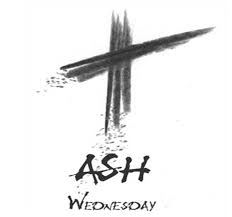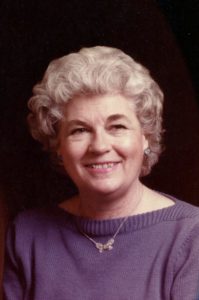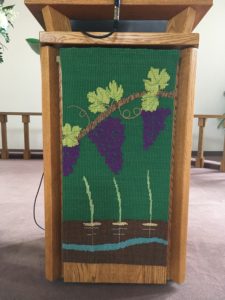The Season of Lent begins with Ash Wednesday on March 1 with a solemn call to fasting and repentance as we begin our journey to the baptismal waters of Easter. During Lent the people of God reflect on the meaning of our baptism into Christ’s death and resurrection. The sign of ashes suggests our human mortality and frailty. What seems like an ending is really an invitation to make each day a new beginning in which we are washed in God’s mercy and forgiveness. With the cross on our brow, we long for the spiritual renewal that flows from the springtime Easter feast to come.
This Week at Good Shepherd, February 27-March 5
Tuesday, February 28
7:00 p.m. – White Privilege Conversation in Fellowship Hall
7:00 p.m. – CLA Circle – Gail Judisch hosts
Wednesday, March 1
7:30 a.m. – Men’s Breakfast
6:00 p.m. – Choir Rehearsal
7:00 p.m. – Ash Wednesday Service
8:00 p.m. – Band Rehearsal
Thursday, March 2
NO Bible Study during Lent
1:30 p.m. – Property & Management Committee
5:00 p.m. – Community Meal at First Lutheran
Friday, March 3
9:00 a.m. – World Day of Prayer, GS Fellowship Hall
Sunday, March 5 – First Sunday in Lent
8:45 a.m. – Choir Warm Up
9:30 a.m. – Worship with Holy Communion
10:30 a.m. – Fellowship Hour
10:45 a.m. – Adult Forum – Christian Advocacy and Community Organizing
10:45 a.m. – Sunday School
Dorothy Magelssen, Charter Member of Good Shepherd, died Monday
Dorothy Bernice ( Johnsrud ) Magelssen died peacefully on Monday, February 20, 2017 at Aase Haugen Senior Services in Decorah, Iowa. A graveside service will be scheduled in early April at East Freeborn Lutheran Church Cemetery in Albert Lea, Minnesota. Her gravesite is next to her husband of 61 years, Johannes Christian Magelssen. Fjelstul Funeral Home is serving the family.
Dorothy was born March 7, 1923 at her home in Freeborn County, the third of eight children to her parents Bernhard and Clara ( Stadheim ) Johnsrud. Growing up on her family’s farm, she shared the many daily duties of farm life with her siblings and parents. She attended her local country school, walking 4 – 5 miles daily during the school year, regardless of the weather, through the eighth grade. Then, encouraged by her father, she attended high school in Albert Lea, graduating in the class of 1941. A modest, humble country girl, in her senior year she was elected Homecoming Queen at Albert Lea High School; the first Homecoming Queen at the school who was not a city girl.
The following year she married Johannes Christian Magelssen, the son of her pastor Finn Magelssen at East Freeborn Lutheran Church on June 25th, 1942. A few months following their marriage, Johannes was deployed to Europe serving in the U.S. Army during WW II. With great joy, Dorothy greeted her husband’s safe return from the war in December, 1945 with their daughter Ruth Marie. It was the first time Johannes had seen their precious daughter who was born during his deployment.
During Johannes’ deployment, Dorothy joined several of her high school girlfriends, forming a support group with other young women whose spouses and loved ones were deployed during WW II. Calling themselves the ” Sewing Club” , they met regularly and following the war continued to be very closely bonded in friendship for the remainder of their lives.
Dorothy’s children remember fondly her example of the importance of family and thinking of others before oneself. She provided a loving home and was a true example with her quiet and unfailing Christian faith throughout her life’s journey. Her faithful commitment in caring for her disabled husband for 36 years prior to his death in 2003 and daily expression of optimism despite those challenges was a true inspiration to all. Her family now rejoices that she is home with her Lord.
Dorothy is survived by her three children: Ruth (Dennis) Green of Decorah, Iowa, David (Penelope) Magelssen of Blaine, Washington, and Mark (Liane) Magelssen of Lihue, Hawaii; ten grandchildren: Cathy (Mike) Reicks, Michele (Ben) MacLennan, Michael Green, Finn (Stacie) Magelssen, Faith (Will) Walker, Ruth Magelssen, Noelle (David) Lau, Marie (Matt) Gutierrez, Joy (Drew) Monahan, Kristen (Dylan) Payne; twenty-one great –randchildren; and her four siblings: Harriet Menke of Bancroft, IA, Cora Arnold of Owatonna, MN, Janet (Herman) Stenga of Soldotna, AK and Barbara (Ron Verdoorn) Schultz of Victoria, MN.
She was preceded in death by her parents; her husband Johannes Christian Magelssen on December 21, 2003; siblings Edith (Damon) Schulenberg, Lila (Victor) Glantz, Bernhard ( Donna) Johnsrud; brothers-in-law John Menke, Deryl Arnold, Leo Schultz; and grandson Jens David Magelssen on August 18, 2014.
In lieu of flowers, memorials may be donated to Aase Haugen Senior Services, 4 Ohio Street, Decorah, Iowa 52101.
Fjelstul Funeral Home in Decorah is serving the family.
Please remember in prayer the family of Dorothy Magelssen, Good Shepherd member. There will be a graveside service for Dorothy in early April at East Freeborn Lutheran Church Cemetery in Albert Lea, Minnesota.
Sermon for Sunday, February 19, 2017 – “Practice Not Perfection”
Sermon for Sunday, February 19, 2017 – “Practice Not Perfection”
Seventh Sunday after Epiphany
February 19, 2017
Good Shepherd Lutheran Church
Decorah, Iowa
Rev. Amy Zalk Larson
Click here to read scripture passages for the day.
Beloved of God, grace to you and peace in the name of Jesus.
Be perfect therefore? Really Jesus? How does that instruction help us to love? When we try to be perfect we can get fixated on ourselves and how we’re doing and end up ignoring the people around us. We can get curved in ourselves. What about grace that sets us free so that we can love and serve others? What about forgiveness?
As it turns out, the Greek word translated here as perfect implies something different than moral perfection. The root word is telos which means reaching one’s intended outcome. Scholar David Lose ex- plains, “The telos of an arrow shot by an archer is to reach its target. The telos of a peach tree is to yield peaches. Which means that we might translate this passage more loosely to mean ‘Be the person and community God created you to be, just as God is the One God is supposed to be.’”
We were created to be people of love, people who live with love. And God intends for us to live out love to help bring in God’s kingdom – a kingdom where hatred has no place, where love permeates and trans- forms everything. Jesus’ call here is not to moral perfection but to love. But how do we live out love in this world of violence and hatred?
Jesus says, “do not resist an evildoer.” That sounds like we’re supposed to just let people walk all over us and never stand up to injustice, like we’re supposed to be passive in the face of those who do harm.
Here again there is a translation problem. The word rendered here as resist actually implies something more like violent resistance, revolt, or armed insurrection. So, a better translation would be “don’t react violently against one who does evil.” Or, as three other books in the New Testament advise, “do not repay evil for evil.”
It seems Jesus is not advocating just being a doormat in the face of evil. Instead, he’s advocating that we resist continuing cycles of vengeance and retaliation. We’re called to oppose violence by choosing to not violently oppose others. As scholar Matthew Myer Boulton writes, “Jesus advises defiance – but not defiance directed against the enemies themselves… rather a deeper defiance directed against the vicious, endless cycles of enemy making.” Jesus tells us not to fight fire with fire but rather to refuse to add fuel to the fire. Or as Martin Luther King Jr. said, “hatred cannot drive out hatred, only love can do that.”
In King and fellow civil rights leaders, in Mahatma Gandhi and others that teach non-violence, we have seen the kind of resistance and defiance that Jesus advocates. We see that it’s possible to resist and love.
Except King and Gandhi feel like examples of moral perfection; what they did seems so out of reach. Besides, their situations are much more extreme than what most of us face. In daily life, we usually struggle more with people who bother us than people who truly hate us. We deal more with annoyances and ideological differences than with persecution.
Yet all of us are called to practice love in all the mundane and difficult aspects of our lives. We can’t do this perfectly; some days we can’t even do it at all. But perfection isn’t the goal. Living into who God created us to be personally and as a community is the goal. This is a step-by-step, slow process.
It begins with prayer – praying for those who hurt us, those we fear, those in power over us. Prayer gives us the opportunity to take a deeper look at these people, to look at them with God. We will struggle to see them as God sees them, as beloved of God. But over time, if we practice looking at them with God in pray- er, our perspective will change. We will slowly begin to see that our struggle is not so much with particular people but with the brokenness that affects us all. Prayer can help us to look at ourselves differently – to see the hurt, anger and hatred we carry – and at the same time, to see that we are still and always beloved of God.
Prayer can also help us to discern what love looks like in a given situation. Does it look like forgiveness, or kindness or non-violent resistance to an unjust policy? There are no easy answers, but personal and communal prayer can guide us just as it guided Martin Luther King Jr.
The next step I think, is listening. This summer a video by a former undercover CIA agent, Amaryllis Fox, was widely shared. In the video, Ms. Fox advocates listening to our enemies. She says, “If I learned one lesson from my time with the CIA, it is this: everybody believes they are the good guy.” She continues, “The only real way to disarm your enemy is to listen to them. If you hear them out, if you’re brave enough to really listen to their story, you can see that more often than not you might’ve made some of the same choices if you’d lived their life instead of yours.”
I think this lesson applies not just to our sworn enemies but also to that difficult family member or co- worker. When we approach people seeking to understand what matters to them and what keeps them up at night, it is much harder to hate them. It is easier to see that our futures are bound up together and that adding fuel to the fires of hatred will devour us all.
Most of all, I think we need to act loving even when we don’t feel like it. Jesus doesn’t tell us we should feel warm and fuzzy towards our enemies or think happy thoughts about them. Instead he calls us to practice love. The practices he describes can help us to live out love regardless of how we feel. When we chose to not respond to hurtful comments or to remain respectful when dealing with a politician we don’t respect; when we go the extra mile to resist injustice with love; when we choose to help a person in need rather than assuming the worst of them; when we share our food and clothing we are shaped into people who live out love. Again, perfection isn’t the goal; rather it is about being who we’re created to be – being people of love.
Martin Luther said that Christian life is not about arriving but always about becoming. In practicing the Christian life, we receive the love that makes us who we are and then we are sent out to be the love we have received.
Let us pray.
Hymn of the Day, #729, The Church of Christ, in Every Age
This Week at Good Shepherd, February 20-26
Tuesday, February 21
5:30 p.m. – Council Potluck – Fellowship Hall
7:00 p.m. – White Privilege Conversation
7:00 p.m. – Council Meeting
Wednesday, February 22
7:30 a.m. – Men’s Breakfast
7:00 p.m. – Choir rehearsal
8:00 p.m. – Band rehearsal
Thursday, February 23
10:00 a.m. – Bible Study with Pastor Amy
12:00 p.m. – Communications Sub-committee Meeting
Sunday, February 26 – Transfiguration of our Lord – New Member Sunday
8:45 a.m. – Band Warm Up
9:30 a.m. – Worship with Holy Communion
10:30 a.m. – Fellowship Hour
10:45 a.m. – Adult Forum – Luther Students on Davis Project for Peace
10:45 a.m. – Sunday School
11:45 p.m. – Sunday School Teacher Training in Pastor Amy’s Office







